Want to know what the best keyword grouping tools are?
These are tools that group semantically related keywords together for better SEO impact.
In this article, we’ve done the research and testing for you.
You’ll discover 9 of the best keyword clustering tools to help take keyword research to the next level.
Let’s dive in.
1. SE Ranking
SE Ranking makes the number one spot for the best keyword grouping tool because it has the most available options.
In addition to its many keyword grouping features, SE Ranking is a powerful keyword research tool and SEO suite.
This is great if you’re looking for an all-in-one solution and not just a tool to group keywords.
The main feature that sets SE Ranking’s keyword grouper apart is that it provides keyword volume data.
Moreover, there are options to customize the accuracy and methods for calculating keyword clusters.
For example, the grouping accuracy setting lets you choose how many matching results should exist in SERPs to find a match.
Thus, resulting in a more refined list of potential keyword groups.
With the search volumes feature, you can also choose from three available options.
- Check the search volume
- Do not check the search volume
- Or upload your own search volume from an independent tool
Reports provide a list of keyword groups with the total search volume per group and the number of keywords.
You can also get quick access to the top 10 results for all keywords in a group.
And each result shares a list of highlighted keywords that were common in search results.
Including these keywords in your content can help optimize SEO even further.
Pros
- Full keyword research suite, including rank tracking, website auditing, and more
- Get the keyword search volume while clustering takes place
- Gain control of clustering accuracy and grouping method
Cons
- The free trial doesn’t include access to the keyword grouping feature
- Keyword grouper costs an additional fee to a monthly subscription
Pricing for SE Ranking is a little different from the other tools in this list, as it’s primarily a keyword research tool.
Starting at $44 when paid annually gives you access to the tool’s main features.
Unfortunately, this fee doesn’t include the keyword grouper, which involves additional charges.
Pricing for keyword grouping starts at $0.004 per query and $0.005 per query with search volume.
2. Keyword Cupid
Next up is Keyword Cupid, a keyword grouping tool great for visualizing clusters and customization options.

Features include options to Bring Your Own Data or B.Y.O.D. or use the simple keyword report.
You can keep things organized by creating projects, and both simple and BYOD methods let you target devices and locations.
The simple keyword report lets you paste a list of raw keywords line-by-line or comma separated.
The BYOD report lets you import keywords from Ahrefs, SEMRush, or a custom tool. Moreover, the BYOD method lets you bring over metrics like keyword difficulty and search volume.
Another cool feature is Serp Spy, which scrapes search results to collect stats for each keyword. Stats include things like average word count and average H2s found.
Using this feature is optional and costs an extra 0.5 credits.
What sets Keyword Cupid apart from others is the way it displays its reports and how you can interact with it.
The interactive mindmap is structured in a hierarchy and split into silo structures of big silos, small silos, and singles.
Clicking on these opens up your list of clusters and the similar keywords within. It’s quite helpful to see which groups have the most keywords.
There’s also a cluster confidence score which adds some clarity to your clusters.
In terms of accuracy, this tool uses advanced AI algorithms to reverse engineer Google’s knowledge graph.
It automatically clusters keywords by search intent so you can devise a highly optimized content strategy.
Pro
- Clear and intuitive user interface
- Very accurate results
- Filtering options let you highlight specific keywords
- Mindmap clusters can be rearranged and edited
Cons
- Can get quite expensive if you need more than 5000 credits for a month
Pricing to try out Keyword Cupid is reasonable, starting at just $9.99 per month, which will give you 500 keyword credits.
There is also a 7-day no limitations trial for $1, which includes 500 credits.
3. Keyword Insights
Keyword Insights is another excellent keyword grouping tool with decent accuracy and it’s easy to use.
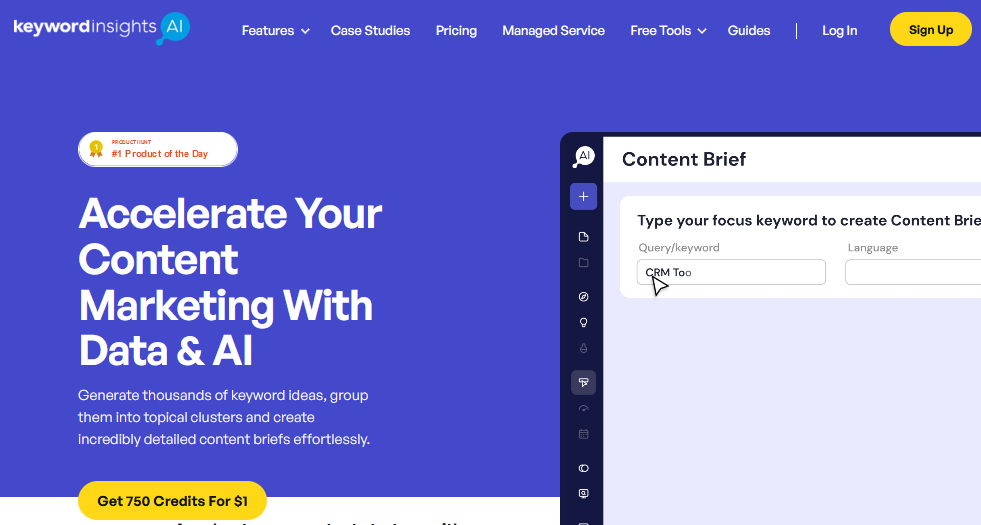
This tool lets you choose between two algorithm methods for clustering keywords together.
The first option is called Centroids, which clusters keywords to a keyword with the highest search volume.
Keywords are added to that group if they share a common number of URLs with the main keyword.
Centeroids typically result in larger clusters and are best used for shorter keyword lists.
Agglomerative clustering provides more accuracy in keyword groupings because every keyword is compared against the other.
This method takes longer to perform than Centeroids and results in smaller, more precise clusters.
Both methods let you choose the number of matching URLs and the level of semantic relevance.
Additional features of Keyword Insights include:
- Group based on context and search intent
- Mapping where you rank for keywords can uncover better optimization opportunities
- Title AI adds a highly optimized title for each keyword cluster
Cluster results are displayed in either table or card layout, making it easy to visualize and manage keywords.
You can also export keywords in Excel or Google Sheets format.
Pro
- Nice user interface
- Lots of additional tools like Keyword Discovery which generates hundreds of related keywords
- Create content briefs to quickly plan and outline articles to be used by your writers
Cons
- Each tool can end up costing more than 1 credit, which can use up credits when using all the available features.
Pricing starts at $49 per month, which gives you 6000 credits. There’s also the option to purchase credits on a pay-as-you-go basis, starting as low as $0.80 for 50 credits. You can get a trial with 750 credits for just $1.
4. KeyClusters
KeyClusters is an excellent keyword grouping tool, not because of its tons of advanced features, but because of its minimalistic approach.
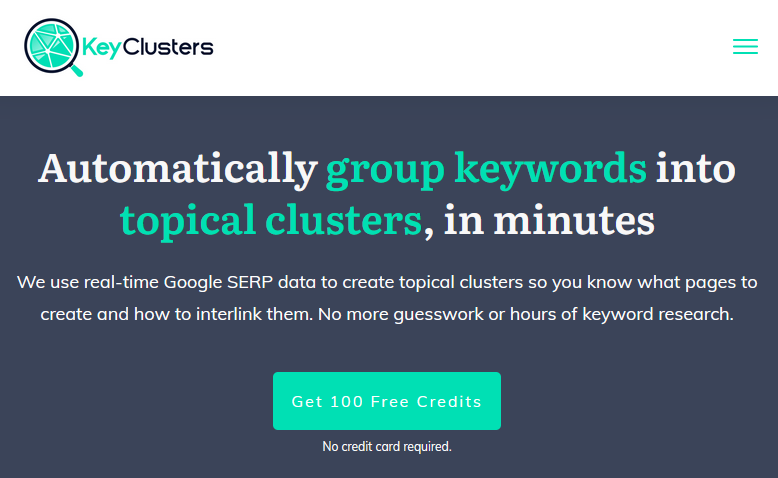
Like the tools above, it uses real-time Google SERP data to cluster keywords that show the same results.
These topic clusters can then be used in the same article to maximize its SEO potential.
When you launch a job, you title the project, select the country and device and upload your keyword list as a CSV.
The CSV file can include keyword difficulty and search volume data collected from an external tool.
KeyClusters then groups the keywords, which you can download in a spreadsheet. It’s also very quick, as it only took a few minutes to cluster 1000 keywords in my test.
The spreadsheet lists the main keyword in the first column with all its related terms to the right, separated by pipes.
This can be useful to quickly copy and paste the keyword cluster into an editor to write the content.
Overall, if you’re looking for a tool with minimal features that gets the job done, then KeyClusters is a great option.
Pro
- Easy to use
- Very clean and simple user interface
- Reasonable pricing
- No monthly subscriptions needed
- Credits never run out
Cons
- Has minimal clustering configurations to choose from
- There are no reports, only a spreadsheet export
You can get 100 credits completely free. Pricing starts at $9 for 1000 credits, and there are no monthly subscriptions as the service is pay-as-you-go.
5. SEO Powersuite
SEO Powersuite is way more than a keyword grouping tool. It consists of four tools that are downloaded onto your PC.
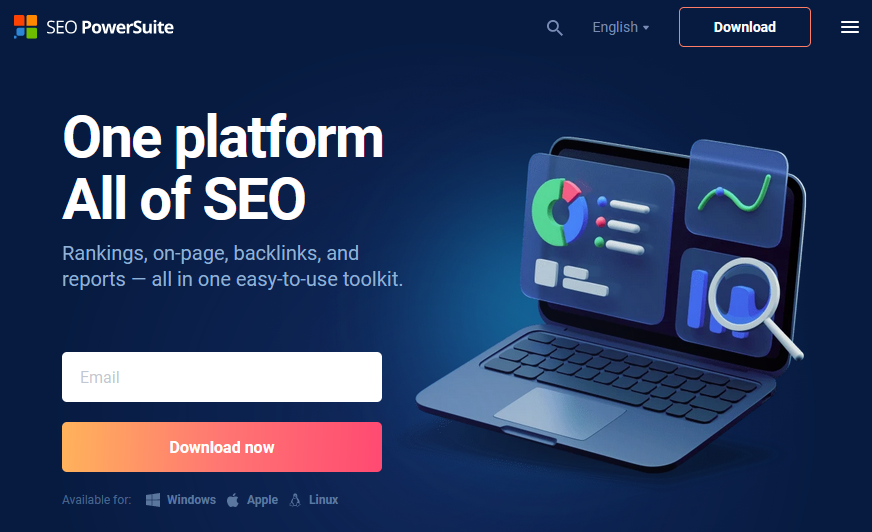
Rank Tracker is the tool that lets you take complete control over keyword research and keyword grouping.
While its keyword grouping feature is minimal, it does make it very easy to keep track of clusters and organize keywords for content.
When you add a site as a project, the tool scans your site and presents you with tons of data about its ranking performance.
Ungrouped keywords show in a sidebar, which can be automatically grouped by semantic similarity, from low to high.
You can also map keyword groups to landing pages of your site, providing a different view for grouped keywords.
Keyword clusters are added to folders which can be additionally arranged and organized.
Other features of the tool let you perform keyword research, do SERP analysis, and competitive research.
This can further assist you in finding more keywords to add to your list, which can be grouped for optimal on-page SEO.
Link Assistant offers a lot of their features for free. However, projects aren’t saved unless you upgrade.
Pro
- Lots of features beyond keyword clustering
- Easy to use and has a clean user interface
Cons
- Keyword clustering features are limited to semantic relationships and not based on live search results
- The tool isn’t the cheapest as you have to pay for 1-year minimum
Pricing for all four tools costs $299 per year for the Professional plan.
6. Pemavor
Pemavor’s tool is one of the most advanced free keyword grouping tools available.
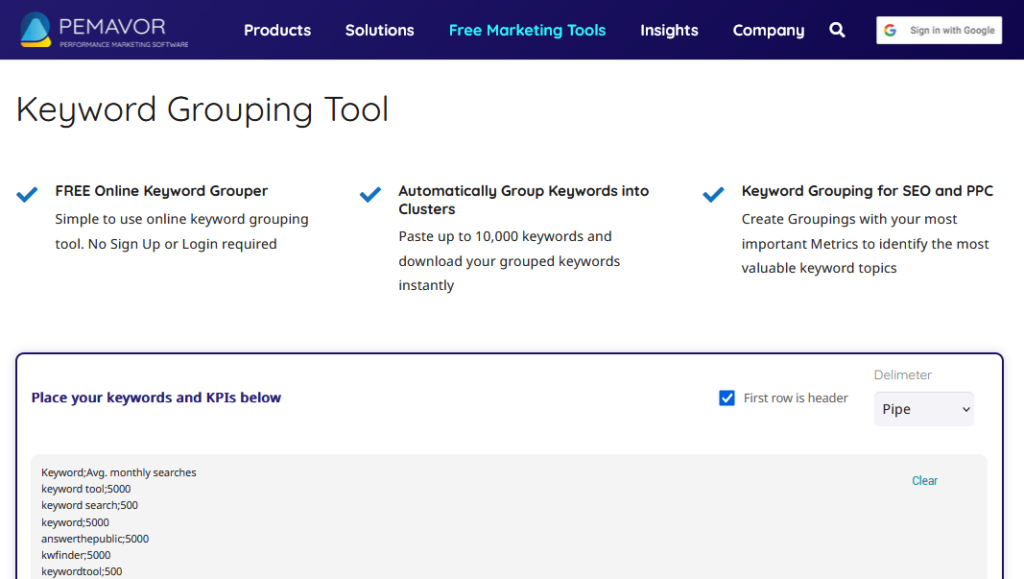
It uses a combination of preprocessing techniques and algorithms to combine words based on similarity.
For example, TF-IDF (Term Frequency-Inverse Document Frequency) weightings are used to calculate the importance of a word in the set of keywords.
DBSCAN is a density-based clustering algorithm that then groups keywords based on their density and separates them from noise.
All of which can result in developing a fast and reliable content strategy and improving SEO.
However, Pemavor doesn’t analyze Google SERPs against keywords like paid tools do.
This can impact the accuracy of the clusters when it comes to search intent.
Nonetheless, this tool is a great alternative if you don’t want to invest in a paid tool yet.
Additional features let you paste up to 10,000 keywords at a time, adjust the similarity threshold, and set a minimal cluster size.
You can also include additional data, such as keyword volume, and export the results in a CSV download.
Pro
- It’s completely free
- Uses multiple technologies to determine keyword similarity
- Allows for up to 10,000 keywords at a time
Cons
- Doesn’t match keywords against SERPs
7. SEOScout
This keyword grouping tool by SEOScout uses a basic NLP system known as n-gram.
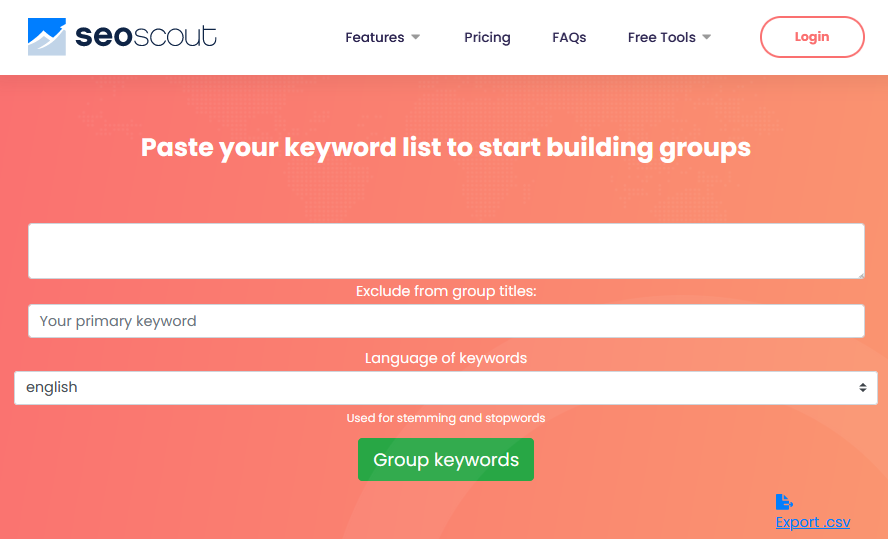
This technology pairs keywords together based on repeating or a combination of the same words.
There are minimal options to configure, which makes it easy to use, and results are shown instantly.
You can choose from several languages and add words to exclude from cluster results.
Moreover, you’re able to download groupings as a CSV file.
Pro
- Very easy to use
- Provides quick results
- Download results as a spreadsheet
Cons
- Doesn’t scan search results
- Uses basic NLP system to match words
If you want more from SEO Scout, paid subscriptions start from $49. They have many tools, such as topic research, content optimization, rank tracking, and more.
8. Contadu
Contadu is another free keyword grouping tool that uses a basic text distance algorithm to analyze and cluster keywords together.
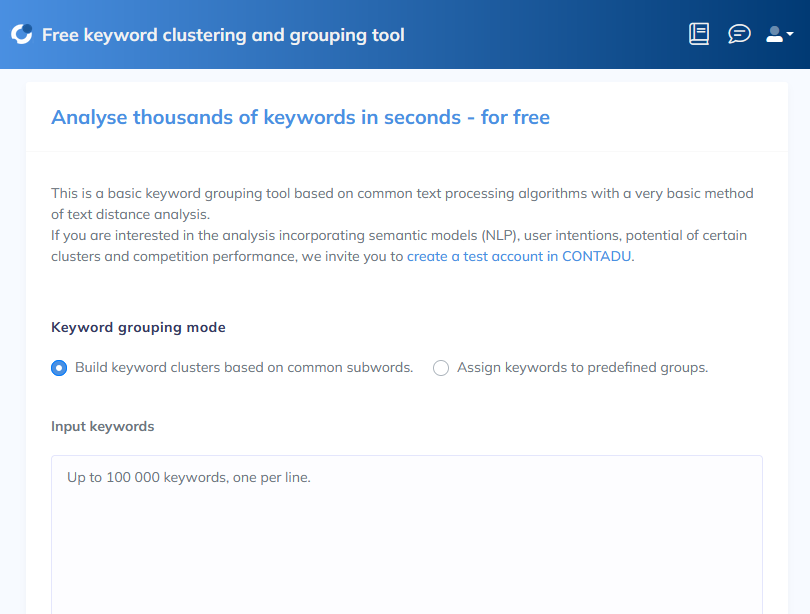
There is also a more advanced version that uses NLP and user intent to determine better accuracy of clusters.
For this, you’ll need to sign up for an account that gives you free limited access for 30 days.
Contadu’s free tool allows you to paste up to 100,000 keywords into the input field and choose between two keyword grouping modes.
Building keyword clusters based on common subwords will compare all words against each other,
And the assign keywords to predefined groups option will group your list to a set of parent keywords you add.
The grouping process is almost instantaneous once you click the generate keywords button.
You’re then presented with relatively accurate clusters of keywords.
These are displayed in boxes that can be copied to the clipboard or exported via an XLS file.
Overall, Contadu is a quick and simple tool to better manage large sets of keywords for optimizing your content strategy.
Pro
- Easy to use
- Cluster up to 100,000 keywords at once
- Download results as a spreadsheet
Cons
- Doesn’t scan search results
- May not be as accurate as paid tools
9. Keyword Clarity
Keyword Clarity is a very unique keyword grouping tool that’s great for visualizing keyword clusters.
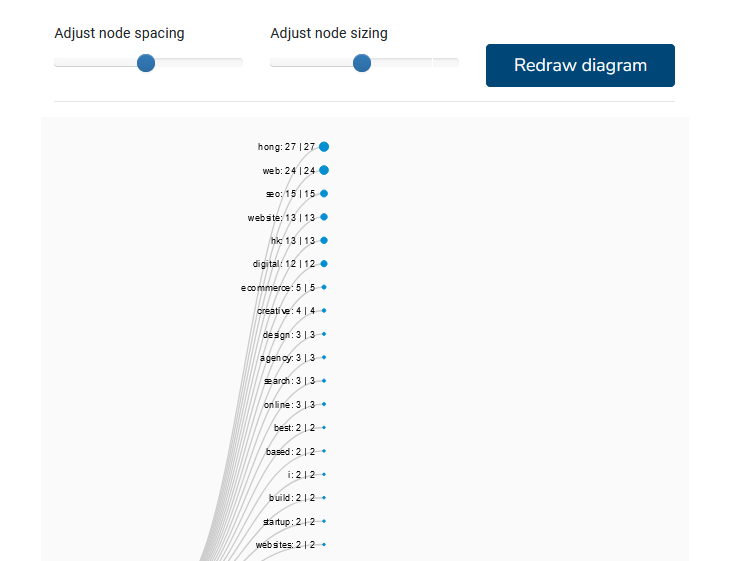
This is a completely free tool and has a lot of useful options to adjust the way clusters are displayed.
Moreover, there is a feature that allows you to connect to Google search console data as a keyword source.
You can also paste keywords in, along with impressions and CTR data.
Features let you filter words and change the display of the mindmap it generates.
For example, you can change the sorting method from cluster count to alphabetical, keep or remove keywords with stop words, and more.
The mindmap shows a list of the groups, which can be expanded when clicked into.
Doing so adds the list of clustered keywords below the mindmap for a clearer view. In addition, you can download clusters into CSV or copy the mindmap as an image.
Pro
- Lots of options to configure the layout and groups of keywords
- Provides a mindmap for a unique visual representation
Cons
- Doesn’t look up SERPs to create clusters
- The Search Console connection didn’t work in my testing
Here are some answers to common questions about keyword grouping or clustering.
How do keyword grouping tools work?
Keyword grouping tools work by grouping words based on semantic relevance, similarity, and context.
Some paid tools will also scan Google SERPs to pair keywords based on common URLs.
Why do I need to group keywords together?
Grouping keywords together is a great way to organize your content strategy.
It also helps improve on-page SEO when a page includes highly relevant terms instead of focusing on one keyword.
How can I group keywords manually?
You can group keywords manually by searching for your main query in Google and identifying common phrases.
Another method is to use Google Search Console to find other keywords a page is already ranking for that doesn’t include the phrase.
Adding more of these keywords to the content can positively impact your SEO performance.
With these keyword grouping tools at your fingertips, you can make significant improvements to your keyword research strategy.
If you’re looking for an all-in-one solution, then SE Ranking offers the most bang for your buck. Keyword Cupid offers a visually appealing mindmap, and Pemavor is a pretty good free option.
Whichever tool you use, you know you’re taking SEO and keyword research seriously when you’re optimizing for multiple keywords.
Good luck!




